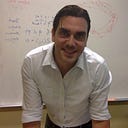Finding Heaven in Numbers
In Pursuit of the Transcendental Reality of Mathematics
Mathematics is this beautiful and private world of pure thought and pure reason. There is no war, no hunger, no pain. No suffering and no regrets. Only beauty. Beauty in its purest form without blemishes and without the messiness of the physical world. It is a product of thought and reason. It does not have any physical counterpart, and it is not an approximation of anything. It is by its very construction and conception its own self, and does not rely on or need to be apologetic for being represented by a less than perfect bastardization of its true nature. (You can never really draw a circle. Only a bad approximation of the idea of a circle.)
Seeing mathematics like this is a spiritual experience, but not in a theological or religious way in the sense of blind belief based on the teachings of others, but in the sense that if God is truly pure and perfect, mathematics is the manifestation of such purity and perfection in the physical Universe.
Georg Cantor, who first discovered set theory, viewed his work as God’s work. In a way, mathematics is just that, the Universe’s native language and everything it has constructed — God’s work’s. Seeing mathematics like this is a spiritual experience, but not in a theological or religious way in the sense of blind belief based on the teachings of others, but in the sense that if God is truly pure and perfect, mathematics is the manifestation of such purity and perfection in the physical Universe. In a transcendental yet very down to earth and tangible real way. Mathematics allows us to feel and experience God, the term which I use here as a label for transcendental perfection, not by necessarily having to blindly believe in Him, by having ‘faith’, but by being allowed to actually ‘see’ Him through understanding and logic. No faith required. To the student of mathematics, God is not asking us to simply believe in him without cause, He is giving us the tools necessary to experience Him directly. Of course, such a gift (rightly so?) does not come easy, and the requirement for such enlightenment is a commitment to a labor intensive, very deep, very prolonged introspective journey through the mathematical Universe. It is a very personal and very humbling experience, because you never truly arrive at any end point or destination. You come to the realization of how vast that universe is, how little you will ever truly understand, and that you’ll never see it all in one lifetime. It is literally a lifelong journey.
In fact, I think heaven is a real physical thing. It is being freed from our physical terrestrial bodies, and the Universe allowing us to see, experience, and take in its full mathematical construction, beauty, and nature all at once.
In fact, I think heaven is a real physical thing. It is being freed from our physical terrestrial bodies, and the Universe allowing us to see, experience, and take in its full mathematical construction, beauty, and nature all at once. Until then, we remain perpetual students of mathematics, struggling and banging our heads against the wall to understand what we can, limited by our terrestrial faculties, but cognizant of everything we are not capable of grasping or understanding. The reward however, is God pulling back the curtain, just a bit, and allowing us to get a taste of the wizard’s magic. To me, that’s not a bad way to spend a lifetime.
